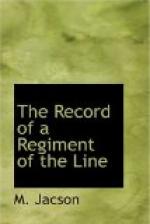February 27th being Majuba Day, the garrison, expecting a demonstration from the Boers, stood to arms at 4.15 a.m., but, much to the astonishment of everybody, not a shot was fired. General Buller sent the garrison in the following message:—
“Colenso rail bridge, which was totally destroyed, is under repair; road bridge partially destroyed; am doing very well, but the country is difficult and my progress is slow; hope to be with you soon.”
Official news was also received that Lord Roberts had surrounded Cronje, who had surrendered with 4000 Boers, the English losses being given as 1700 killed and wounded.
On the 28th rations were further cut down to one biscuit and three ounces of mealies, with one pound of horse as before per man. This was perhaps the most distressing circumstance connected with the siege, and it had a most depressing effect. It was not so much the reduction of the ration that was of consequence, as the reason for the reduction. This could not be guessed at, and it gave rise to conjectures, the chief being that Buller had again failed, and could not get through. His shells had been seen bursting on the hills, and that had encouraged the garrison; but the garrison had been encouraged before by the sight of Buller’s shells bursting on Thabba Nyama. Three days previously, owing to the good news received from Buller, the garrison had been put on full rations, but now, after further good news, the order was promulgated:—
“Highly satisfactory reports have been sent from General Buller as to his advance, but the country is difficult and progress slow, therefore I am obliged to reduce the ration, etc. etc.”
This sudden cancelling of the increase of the ration, and its still further reduction in the face of the news received and in the sight of Buller’s shells, was disappointing. Having ascertained that the garrison could exist till April 15th and not longer, and that then there would not be a horse, ox, or mule left, Sir George White, much against his will, but to make things certain in case General Buller was again checked, gave the orders for the reduction on the day before the relief.
During the day the big gun on Bulwana made an attempt to reach Observation Hill Post, which were the furthest works from him in that direction. His attempt succeeded, and he put many shells into the works. His record for the siege was an attempt to reach Wagon Hill. He failed in this, but his range, as measured on the map, was 11,560 yards, or 6 miles and 1000 yards.
February 28th, the last day of the siege, was very hot and oppressive; everybody seemed depressed, trying to guess at some reason for the ration reduction. At about 2 p.m., however, Major Riddel, brigade-major to Colonel Knox, came up to the officers’ mess smiling all over, and said that excellent news, the very best, had come in, but that “it is confidential, and I am not allowed to say what it is.” He called for volunteers who were willing and able to march seven miles and fight at the end of it. The whole Regiment, officers and men, volunteered, but after a medical examination had been made of the battalion, only one hundred men were found to come up to requirements.




